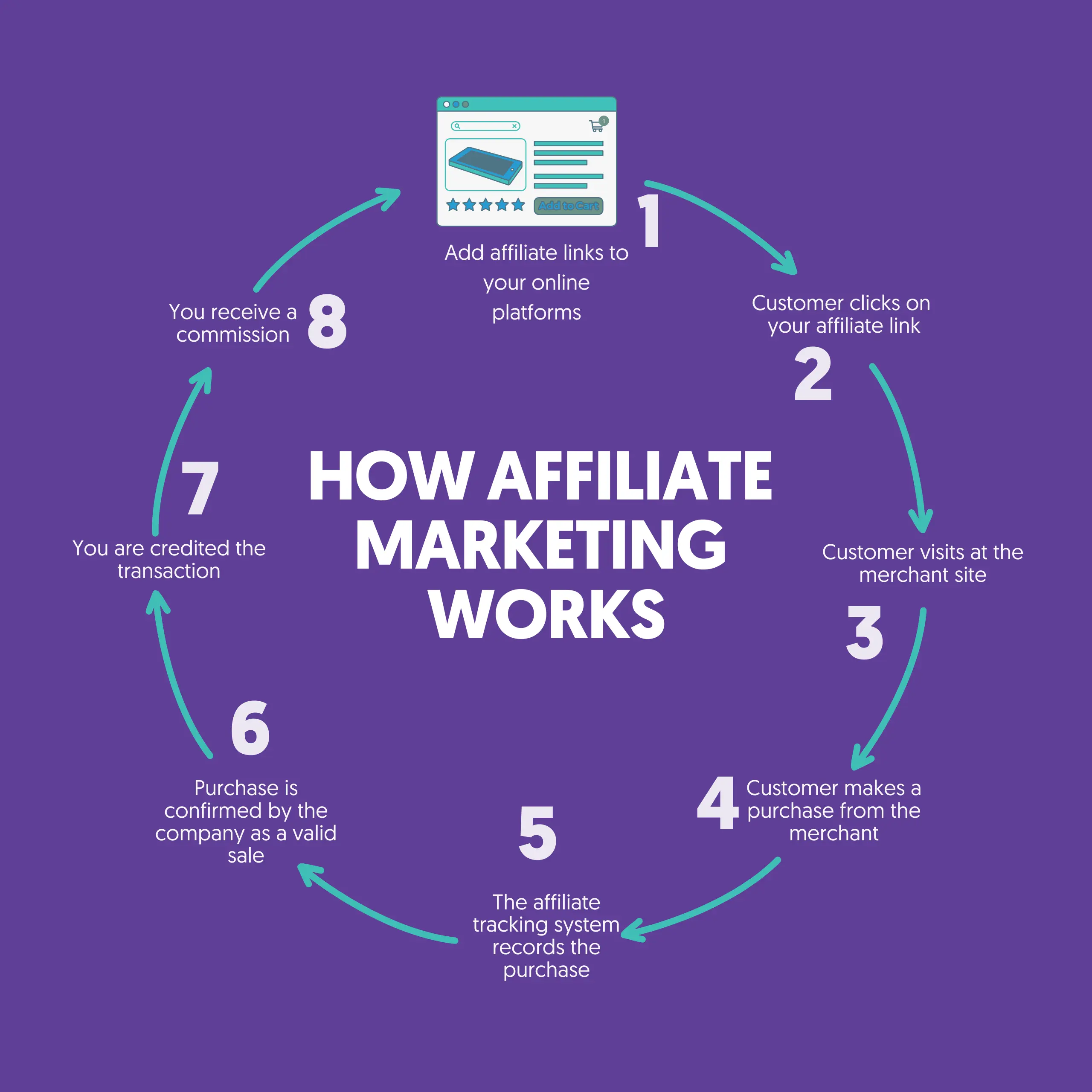Top Affiliate Marketing Posts

Affiliate Marketing Without Showing Your Face: 8 Easy Ways to Start in 2024
Affiliate Marketing Without Showing Your Face (8 EASY Ways to Start) [2024]
Introduction:
Affiliate marketing offers a fantastic opportunity to earn income online without the need to reveal your identity or show your face. Whether you're camera-shy or prefer maintaining your privacy, there are numerous strategies you can employ to successfully promote products and generate commissions.

Disclosure: This post contains affiliate links, meaning that if you purchase something through the links below, I will receive a commission at no cost to you. Learn More
Have you ever wondered how to dive into the lucrative realm of affiliate marketing without putting yourself in the spotlight? You're not alone. Affiliate marketing presents a distinct opportunity to earn income online by endorsing products and services, all while maintaining anonymity and without the necessity of showcasing your face.
Whether you prefer privacy or are camera-shy, affiliate marketing without revealing your face empowers you to harness the internet's potential to your advantage.
Stay tuned as we explore how you can effectively utilize affiliate marketing without the necessity of building a personal brand.
Best Ways to Do Affiliate Marketing Without Showing Your Face
What is Affiliate Marketing?

Affiliate marketing is a performance-based marketing strategy where businesses (merchants or advertisers) reward affiliates (publishers or marketers) for each visitor or customer brought about by the affiliate's marketing efforts. Affiliates promote products or services through various channels such as websites, blogs, social media, email, or videos, using unique affiliate links provided by the merchant. When a user clicks on the affiliate link and makes a purchase or completes a desired action (like signing up for a newsletter), the affiliate earns a commission or a predetermined reward from the merchant. It's a popular method for businesses to drive sales and for individuals to earn passive income online without owning the product or service themselves.
How Does Affiliate Marketing Work? (The Basics)
Affiliate marketing operates on a simple yet effective model that involves several key players and steps:

Merchants (Advertisers): These are businesses or individuals who have products or services to sell. They enlist affiliates to promote their offerings in exchange for a commission.
Affiliates (Publishers): Affiliates are individuals or entities that promote the products or services of merchants through various online channels. They earn commissions for driving traffic, sales, or other desired actions to the merchant's website.
Affiliate Networks (Optional): Affiliate networks act as intermediaries between merchants and affiliates. They provide a platform where merchants can list their affiliate programs and affiliates can find suitable products to promote. Networks also handle tracking, reporting, and commission payouts.
Consumer: The end-user or consumer plays a crucial role by clicking on affiliate links placed by affiliates. When consumers make a purchase or complete a specified action (like signing up for a newsletter) through the affiliate link, it triggers a commission for the affiliate.
Benefits of Affiliate Marketing Without Showing Your Face:

Privacy: Maintain anonymity and privacy while still earning income online.
Flexibility: Work from anywhere and at any time without the need for personal appearances.
Scalability: Build scalable income streams by leveraging digital platforms and affiliate partnerships.
Low Barrier to Entry: Start with minimal upfront costs compared to traditional businesses.
Diverse Income Sources: Promote multiple products or services across different niches, diversifying your revenue streams.
Global Reach: Access a global audience without geographical limitations.
Passive Income Potential: Earn commissions on sales generated by content you create once, providing ongoing passive income.
Focus on Content Quality: Prioritize creating valuable content without distractions from personal branding efforts.
How to Do Affiliate Marketing Without Showing Your Face
![Affiliate Marketing Without Showing Your Face (8 EASY Ways to Start) [2024] Affiliate Marketing Without Showing Your Face (8 EASY Ways to Start) [2024]](https://monetizedfuture.com/wp-content/uploads/2024/02/faceless-affiliate-marketing-1024x585.png)
Niche Selection Strategies:
Choosing the right niche is a foundational decision in affiliate marketing, influencing the effectiveness and sustainability of your efforts. Here’s a theoretical exploration of niche selection strategies:
Affiliate marketers often begin by identifying their personal interests and passions. This approach ensures a genuine engagement with the niche, fostering sustained motivation and enthusiasm. When aligned with personal interests, marketers are more likely to produce authentic content that resonates with their audience.
Researching market demand is equally critical. Analyzing trends, consumer needs, and purchasing behaviors helps identify niches with substantial potential for profitability. High-demand niches often revolve around evergreen topics such as health, personal finance, lifestyle improvements, and technology solutions.
In conclusion, successful niche selection in affiliate marketing combines personal passion with thorough market analysis. By aligning interests with market demand, understanding audience dynamics, and planning for long-term viability, marketers can establish a solid foundation for sustained profitability and growth.
Creating a Professional Website or Blog:
To begin, select a domain name that resonates with your niche and is easy for visitors to remember. Next, choose a reliable web hosting provider that offers sufficient bandwidth and storage to handle your website's needs. Then, install a user-friendly content management system (CMS) such as WordPress, which allows you to easily manage and update your content.
Design your website with a clean and professional layout that enhances user experience and reflects your brand. Focus on creating high-quality content that provides value to your target audience, such as informative articles, product reviews, or tutorials related to your niche.
Optimize your website for search engines (SEO) by incorporating relevant keywords into your content and meta tags. Integrate affiliate links seamlessly within your content, ensuring they are relevant and disclosed transparently to your audience.
Engage your visitors with clear calls to action (CTAs) that encourage them to click on affiliate links or subscribe to your newsletter. Use web analytics tools to track visitor behavior and performance metrics, allowing you to refine your strategies and improve conversion rates over time.
Lastly, ensure your website complies with legal requirements and affiliate program terms to build trust with your audience and protect your business interests.
By following these steps, you can create a professional and effective website or blog for affiliate marketing, positioning yourself for success in the competitive online marketplace.
SEO Optimization Techniques:
Begin by conducting keyword research to identify relevant keywords and phrases your target audience uses. Incorporate these keywords naturally into your website's content, including titles, headings, and throughout the body text.
Ensure your website's structure is well-organized and user-friendly, with clear navigation and fast loading times. Optimize your images by using descriptive alt text and reducing file sizes to improve page load speed.
Create high-quality, valuable content that addresses the needs and interests of your audience. Regularly update your content to keep it fresh and relevant, which can improve your search engine rankings.
Build backlinks from reputable websites within your industry to increase your website's authority and credibility. Foster engagement on your website by encouraging social sharing and interaction with your content.
Monitor your website's performance using analytics tools to track visitor behavior, traffic sources, and conversion rates. Use this data to refine your SEO strategies and improve your website's overall performance in search engine results.
By implementing these SEO optimization techniques effectively, you can enhance your website's visibility, attract more organic traffic, and ultimately achieve better results in search engine rankings.
Strategic Content Creation:
Strategic content creation involves creating valuable, targeted content that meets your audience's needs and supports your marketing goals. Start by understanding your audience through research and tailor your content to provide practical solutions to their challenges.
Integrate relevant keywords naturally into your content to improve its visibility in search results. Regularly publish fresh content like blog posts, articles, videos, or infographics to keep your audience engaged and attract new visitors. Diversify content formats to reach a broader audience.
Establish your authority by sharing valuable insights and industry knowledge. Position yourself as a trusted source in your niche to build credibility and encourage repeat visits.
Measure your content's performance using analytics. Track metrics like traffic, engagement, and conversions to understand what resonates with your audience. Use these insights to refine your content strategy and improve results over time.
In essence, strategic content creation involves understanding your audience, optimizing for search engines, maintaining consistency, establishing authority, and using analytics to continuously improve your approach.
Leveraging Email Marketing:
Firstly, build an email list of subscribers interested in your niche by offering incentives like free guides or exclusive content. Segment your list based on demographics or interests to send personalized content that resonates with each group.
Create compelling email content that addresses subscriber needs and interests. Include informative articles, product recommendations, and special offers related to your affiliate products. Integrate affiliate links naturally within your content, ensuring transparency about your affiliate relationships.
Utilize email automation tools to schedule and automate campaigns such as welcome sequences or drip campaigns. Test different elements like subject lines and CTAs to optimize open rates and click-through rates.
Adhere to email marketing regulations and respect subscriber preferences for a compliant and trustworthy approach. Measure campaign performance through analytics to track metrics like open rates and conversions, refining your strategy based on insights.
By implementing these strategies, email marketing can effectively enhance your affiliate marketing efforts by nurturing relationships, delivering targeted promotions, and driving affiliate sales.
Utilizing Social Media Platforms:
Start by choosing the right platforms based on where your target audience is most active. Create professional profiles that reflect your brand and niche, using consistent branding and messaging across all channels.
Develop a content strategy that aligns with your audience's interests and needs. Share valuable content such as informative articles, product reviews, tutorials, and tips related to your affiliate products. Use visuals like images and videos to capture attention and enhance engagement.
Integrate affiliate links strategically within your social media posts, ensuring they add value to your audience. Disclose your affiliate relationships transparently to build trust with your followers.
Engage with your audience by responding to comments, asking questions, and fostering conversations. Encourage user-generated content and testimonials to showcase real-life experiences with the products or services you promote.
Utilize social media advertising to target specific demographics, interests, or behaviors relevant to your niche. Run paid campaigns to promote affiliate products or drive traffic to your website or blog where affiliate links are embedded.
Monitor and analyze your social media performance using analytics tools. Track metrics like reach, engagement, click-through rates, and conversions to evaluate the effectiveness of your efforts. Adjust your strategy based on data insights to optimize results over time.
By leveraging social media platforms strategically, you can expand your reach, increase brand awareness, drive traffic, and ultimately boost affiliate sales effectively.
Transparent Affiliate Disclosure:
Transparent affiliate disclosure is a straightforward practice where you openly inform your audience that you may earn a commission if they purchase products or services through your affiliate links. This disclosure should be visible and placed before any affiliate links, ensuring it's easy for your audience to see and understand. It's important to use clear language that leaves no ambiguity about your financial interests in promoting certain products.
By being transparent about your affiliate relationships, you build trust with your audience. They appreciate your honesty and are more likely to trust your recommendations knowing that you benefit financially. This transparency also helps you comply with legal requirements, such as the FTC guidelines in the United States, which mandate clear disclosure of affiliate relationships in online promotions.
In practice, this means including a statement like "Disclosure: This post contains affiliate links. If you click through and make a purchase, I may earn a commission at no additional cost to you." This disclosure should be present in all relevant content formats, such as blog posts, social media posts, emails, and videos, wherever affiliate links are used. Regularly review and update your disclosure practices to ensure they remain current and comply with any changes in regulations or best practices.
By consistently practicing transparent affiliate disclosure, you demonstrate integrity to your audience, enhance their trust in your recommendations, and maintain compliance with legal standards, ultimately supporting your long-term success in affiliate marketing.
Final Thoughts…
In exploring affiliate marketing without showing your face, it's evident that there are numerous accessible avenues to embark on this journey. Whether you're camera-shy or prefer privacy, leveraging digital platforms and content creation can effectively promote products and generate income. By focusing on niches aligned with your interests, utilizing SEO strategies, and mastering email and social media marketing, you can establish a successful affiliate marketing venture without stepping into the spotlight.
Remember, transparency in disclosing your affiliate partnerships is crucial. Honesty fosters trust with your audience, enhancing credibility and long-term relationships. Embrace continuous learning and adaptation to stay ahead in this dynamic field, ensuring your strategies evolve with market trends and consumer behavior.
Ultimately, affiliate marketing offers a flexible and lucrative opportunity to thrive in the digital age, regardless of whether you choose to reveal your face. Stay committed to providing value, engaging authentically with your audience, and refining your skills to achieve sustainable success.
© 2024 AI Profits Engine
